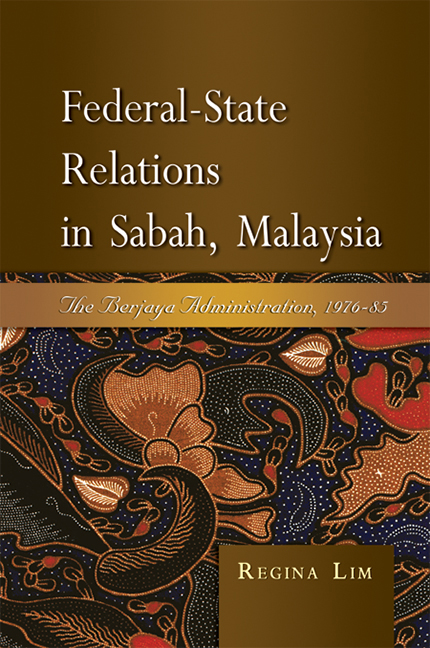Book contents
- Frontmatter
- Contents
- List of Tables and Figures
- Acknowledgements
- Abbreviations and Glossary of Terms
- 1 Introduction
- 2 Sabah Before Malaysia
- 3 Contesting the Rules of the Game, 1963–76
- 4 BERJAYA and Federal-state Relations
- 5 Development and Patronage
- 6 The Contest for Islamic Leadership and Multiracial Votes
- 7 Epilogue and Conclusion
- References
- Index
- About the Author
3 - Contesting the Rules of the Game, 1963–76
Published online by Cambridge University Press: 21 October 2015
- Frontmatter
- Contents
- List of Tables and Figures
- Acknowledgements
- Abbreviations and Glossary of Terms
- 1 Introduction
- 2 Sabah Before Malaysia
- 3 Contesting the Rules of the Game, 1963–76
- 4 BERJAYA and Federal-state Relations
- 5 Development and Patronage
- 6 The Contest for Islamic Leadership and Multiracial Votes
- 7 Epilogue and Conclusion
- References
- Index
- About the Author
Summary
It is just not true that [Sabahans] feel themselves blood-brothers to the Malays — the marriage would have to be one of convenience, and, if it is to survive, of mutual convenience
Lord Cobbold, Chairman of the Commission of Enquiry for North Borneo and Sarawak, 1962INTRODUCTION
When Sabah joined Malaysia, it was still a colonial-administered territory. Unlike in Malaya, pre-independence elections had never been instituted and the level of political awareness in Sabah was low. This began to change when the Malaysia plan was proposed in the early 1960s, providing the impetus for the emergence of at least five political organizations defined along ethno-religious lines. The leaders of each political organization, such as Mustapha Harun, Donald Stephens, and G. S. Sundang, emerged as pre-eminent in the local political scene because, as Native Chiefs, they had played a considerable role within local authority establishments in the British Colonial Administration. Prominent Chinese businessmen had also been actively involved in the Legislative council, since the days of the BNBC, as well as in collective organizations through the Chinese Advisory Board during the Colonial Administration. The emergence of a political trend dominated by these personalities was conditioned by their political relations with the Governor. Because of the relative weakness of political institutions in Sabah, there was more scope for these personalities to dominate the political scene (Loh 1997), giving the appearance that politics in Sabah consisted of little more than their changing political fortunes. The autonomy of these local ‘big-men’ (cf. Abinales 2000) was, however, circumscribed by the influence of the Federal Government in Kuala Lumpur. The early years of Malaysia were hence a period of some considerable political turbulence, as these local leaders and their associated ethnic elites vied both with the Federal Government and against each other to consolidate the ‘rules of the game’ in their favour. The diverse ethnic and religious constellation of the state meant that the Sabah Alliance formula, directly imported from the Peninsula, was considerably less stable than its West Malaysian counterpart.
- Type
- Chapter
- Information
- Federal-State Relations in Sabah, MalaysiaThe Berjaya Administration, 1976–85, pp. 40 - 57Publisher: ISEAS–Yusof Ishak InstitutePrint publication year: 2008

